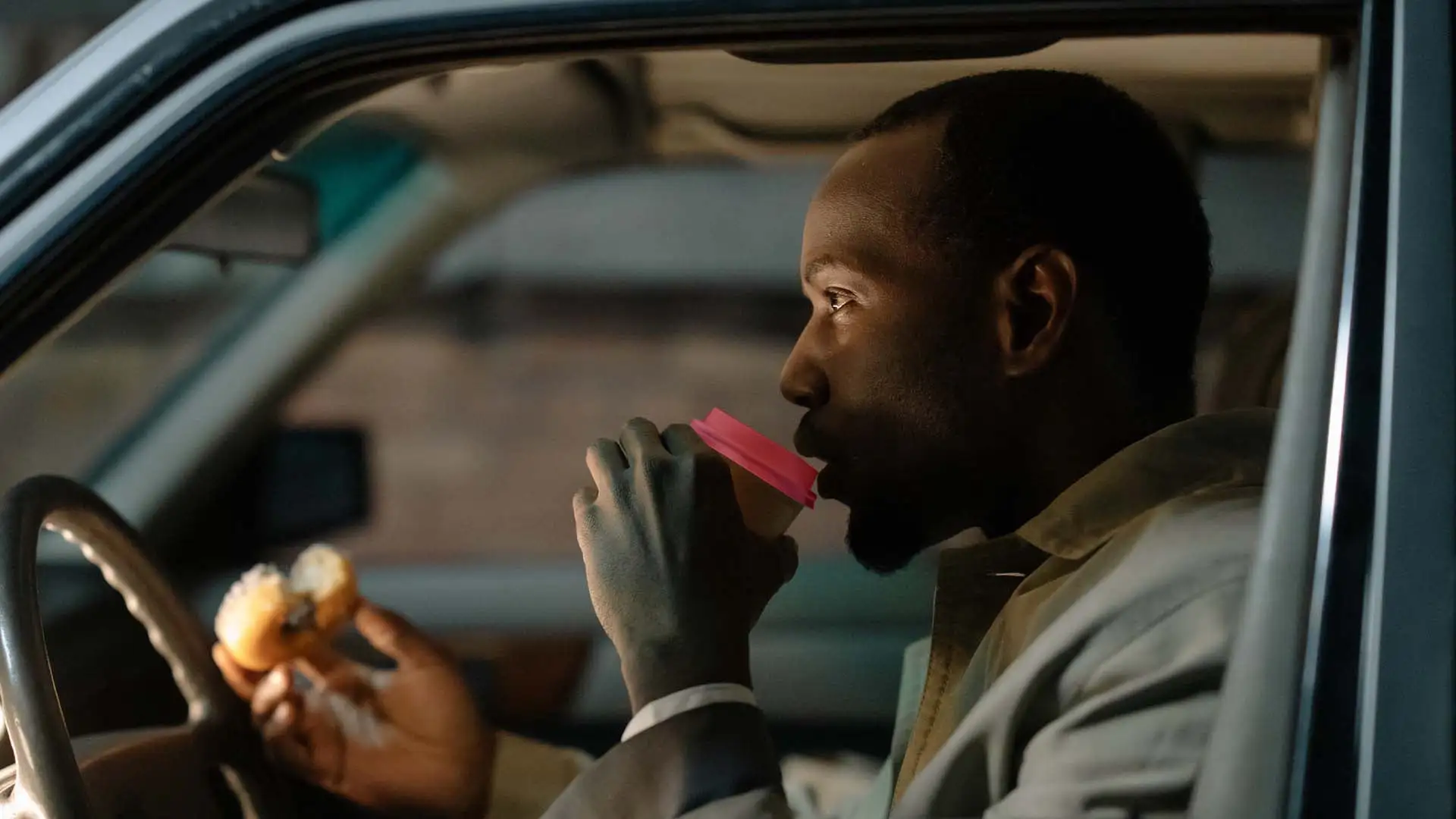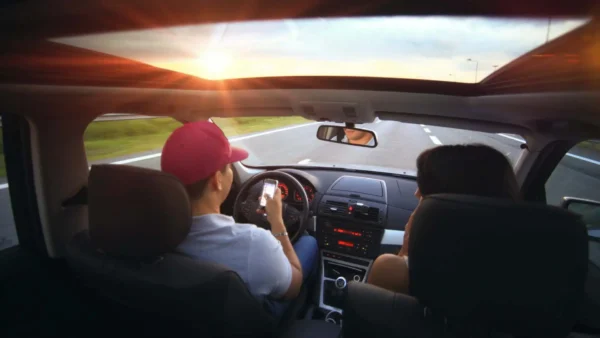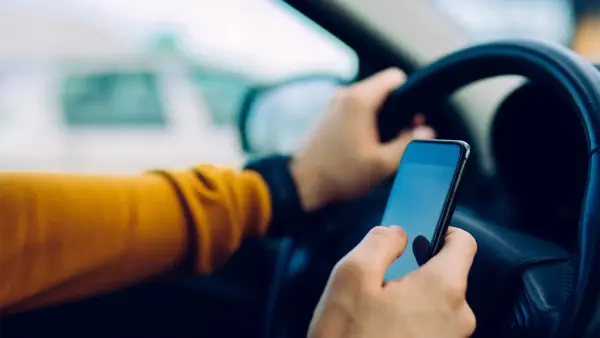Much has been made about new technologies that are making cars safer, but at the same time that manufacturers are adding lane departure sensors and emergency brake assist to their vehicles, many are also including built-in GPS and a variety of infotainment options that can take your attention away from driving. Add that to crying kids and drive-thru breakfast, and it all equals more accidents and more deaths on our roads.
Driving distracted leads to over 6,000 accidents and 70+ deaths per year in Ontario. That makes it more deadly than speeding, not wearing a seatbelt and even impaired driving. Even in 2020, with traffic way down due to the pandemic, Ontario recorded 45 deaths that were attributed to driver distraction.
Distracted driving didn’t start with the proliferation of smartphones in the early 2000s, but it certainly became a lot worse. It wasn’t until 2009 that Ontario passed legislation to curb distractions, but the law focuses on hand-held devices, and while it surely has saved some lives, all of the stats above are from AFTER distracted driving ostensibly became illegal in the province.
Is banning texting enough?
Ontario’s distracted driving law actually allows drivers to interact with electronic devices as long as they are fixed to the vehicle dashboard. And in recent years, car manufacturers have made it possible to have most of the features of your smartphone available to you via touch screens and voice commands as you drive. Features include:
- Voice calls
- Texting (via voice recognition)
- GPS
- Audio streaming (Spotify, Apple Music)
Add to that the fact that many cars have now incorporated older features like radio and climate control into the same menu as the newer features, and you can see how a driver has lots of opportunity to get lost in their LCD screen. Although most cars now have voice control options, not all drivers are savvy enough to set it all up. The result can be lots of time spent scrolling through menus, looking for your favourite song or a phone number.
What is legally considered distracted driving in Ontario?
Nine times out of ten, distracted driving tickets are handed out for using a cellphone, but the law also can apply to an iPod, a laptop, a GPS or any portable media player that is visible to the driver.
Here’s a few of the situations that could get you charged and convicted:
- Typing or using the mouse on a laptop, tablet or other electronic device
- Reading from a smartphone, tablet or laptop
- Holding your smartphone, iPod, GPS, tablet or gaming device in your hand (doesn’t even matter if it’s on)
- Manually texting, whether the phone is in your hand or mounted
- Manually dialing, whether the phone is mounted or not (the exception is to call 911 in an emergency)
- Playing or even watching a gaming device
- Watching a video on a tablet, laptop or other media player
- Manually programming your GPS, even if it’s built-in or mounted
A word of advice: The law has been worded in such a way that it’s very unlikely you’ll get the benefit of the doubt in court. All of the above is illegal even if you’re at a red light. If you have a cellphone, tablet, gaming device, laptop, iPod, GPS or other electronic device with you while driving, don’t have it in the front seat. Pack it away in the back or in the trunk. Any cellphone or GPS that you plan to use in hands-free mode while driving should be mounted firmly on the dash, and should not move from the mount until you arrive at your destination. Program the GPS before you start driving.
What are the penalties for distracted driving?
The penalties for distracted driving in Ontario were increased in 2019. Below is a summary:
Distracted driving penalties for fully licensed drivers(A, B, C, D, E, F, G and/or M license) | |
| 1st offence |
|
| 2nd offence |
|
| 3rd and subsequent offences |
|
Distracted driving penalties for new drivers(G1, G2, M1 or M2 license) | |
| 1st offence |
|
| 2nd offence |
|
| 3rd and subsequent offences |
|
And how ‘bout your insurance premiums? Because of the mounting evidence that distracted driving is as dangerous or more dangerous than impaired driving, many insurance companies now consider it a major conviction (as opposed to minor like most speeding tickets). So that ticket alone is likely to double your premium, or more.
What is not covered by distracted driving laws?
There are a lot of things that can distract you from your driving, but there are only some that are specifically banned. Here’s some of the circumstances that probably won’t get you a ticket, but that you should try your best to avoid, for the safety of you and your passengers.
- Eating while driving
- Drinking while driving (non-alcoholic beverages)
- Smoking while driving
- Reaching into the back seat
- Bugs (especially flying bugs) in the car
Then there are the distractions related to operation of the vehicle itself:
- Adjusting the mirrors
- Adjusting the driver’s seat
- Signalling, turning on wipers etc.
Lastly, but importantly, we sometimes forget that the biggest distractions can be the other passengers in the car, or even our own thoughts.
For many of us, driving can become second nature, and we find ourselves concentrating on a lot of the things listed above instead of on the road. The fact is that a police officer can charge you with careless driving, or even dangerous driving, for any of the above, but it will likely only happen if you actually get into an accident, and then admit to the officer that you weren’t paying attention.
Be present when driving
A lot of us are still getting used to the new technology in our vehicles, and gradually figuring out what we can do safely while driving. Forgetting for a second about what technically constitutes distracted driving under the law, we should all start from the premise that when we’re driving, that has to be the main thing we’re doing, because at 100 km/h, we travel about 100 metres in 4 seconds. Even if your eyes stay on the road, focusing your mind on something else for more than a second could be too long.
Those who practice mindfulness meditation talk a lot about the importance of being present. That means having our minds fully focused on where our bodies are, instead of becoming lost in abstract thoughts, memories, worries, or physical distractions.
A few tips for staying present when driving:
- Especially if you’re driving a car you don’t know, familiarize yourself with the controls and how they work before getting on the road.
- If your vehicle has voice controls, learn how to use them. Your dealer will usually have videos or even live training sessions.
- Adjust mirrors and seats while parked.
- If you’re hungry or thirsty, enjoy your snack in the parking lot of the coffee shop.
- If you need to attend to kids in the back seat, pull over first.
- If you don’t know where you’re going, plan your route or program your GPS before you leave. Don’t engage in complex or emotional conversations (with passengers or on the phone) while driving. Mental distraction can be as dangerous as physical distraction.
- If a flying bug gets in the car, pull over, make sure it’s gone, then get back to driving.
Hey, we know you’re not going to do all of the above all of the time, but every distraction you can get rid of means a little more of your attention is where it should be.
And whether you’re 100% undistractable, have multiple distracted driving tickets, or fall somewhere in between, you’ll need auto insurance, and Mitch Insurance represents dozens of different insurance companies that want to compete for your business. Our auto insurance brokers are here for you anytime.
Just maybe don’t call while you’re driving…
Looking for car insurance?
Speak with a Mitch Insurance broker today to get an Ontario auto insurance quote.
Call now
1(403)8000267







